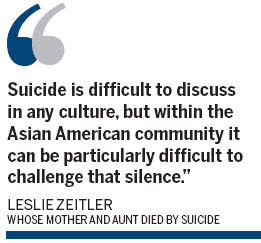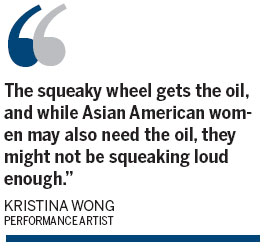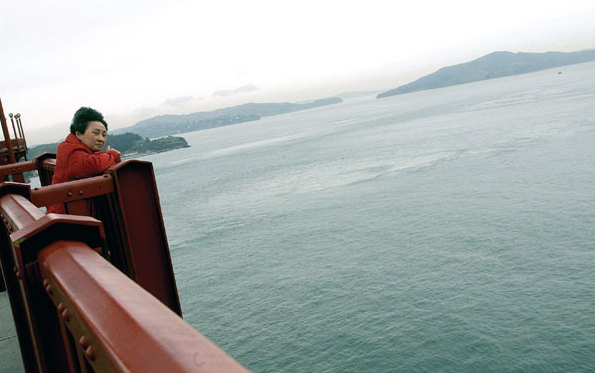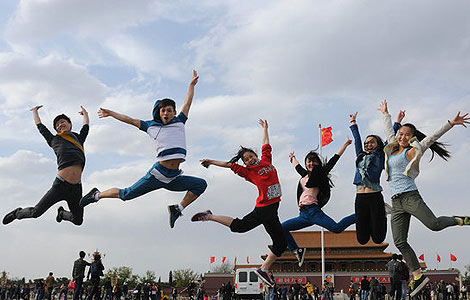Taking on the 'hungry ghosts'
Updated: 2013-10-11 11:08
By Kelly Chung Dawson (China Daily)
|
|||||||||
Asian American women commit suicide at startlingly high rates, and while the causes cover a myriad of issues, the most difficult part may be the silences that surround it, reports Kelly Chung Dawson in New York.
When social worker Leslie Zeitler stood up to speak at her aunt's funeral several years ago, she addressed what more than a dozen other speakers had neglected to mention.
"There's something that hasn't been talked about, but I think is important for everyone here to know," she said to a packed room, filled mostly with Asian Americans linked to the Chinese half of her family. "My auntie died by suicide, and she's not the only one in this family to die by suicide. My mother - her younger sister - also died by suicide. We have a problem we need to talk about."
The room emptied of both air and sound as 200 guests seemed to hold their breath, Zeitler recalled later. Afterward, no one mentioned her speech.
|
Asian American women between the ages of 20 and 69 ranked second-highest among suicides across all ethnicities between 1981 and 2010, according to the Centers for Disease Control and Prevention. Above, a woman enjoys the view from the Golden Gate Bridge in San Francisco, site of many suicides over the years. Via CFP |
"I thought, this is the second time someone in the family has committed suicide and you all still aren't going to talk about it?" she said. "Suicide is difficult to discuss in any culture, but within the Asian American community it can be particularly difficult to challenge that silence."
Chinese culture has long romanticized the idea of chi ku, the act of eating and enduring your bitterness. For Asian American women grappling with mental-health issues, a combination of factors including pressure to succeed, an aversion to burdening others and the perceived stigma of seeking help in what some have called "a culture of silence" has contributed to startlingly high suicide rates.
Asian American women between the ages of 20 and 69 ranked second-highest among suicides across all ethnicities between 1981 and 2010, according to the Centers for Disease Control and Prevention. Most shockingly, Asian American women older than 65 and girls between the ages of 5 and 9 have the highest suicide rate of any ethnicity in the US, according to the CDC. For elderly women, the suicide rate was 6.5 per 100,000, compared to 4.3 among white women of the same age group.
Between 1996 and 2004, 11 of 20 suicides at Cornell University in Ithaca, New York, involved students of Asian ethnicity, a disproportionately high statistic for a student body that was 14 percent Asian American at the time.
"While ethnicity isn't directly linked to mental health, culture matters," said Joyce Chu, an associate professor at Palo Alto University in California who has studied suicide in the Asian American community. "There are important cultural considerations that put Asian Americans with mental-health problems at a higher risk for being underserviced."
Mental-health services
Asian Americans don't necessarily suffer from depression at a higher rate than other ethnicities, but they are much less likely to seek help until their emotional circumstances have become unbearable, said Amy Lam, health-equity program director for Community Health for Asian Americans in Oakland, California.

Less than 9 percent of Asian Americans use mental-health services, compared to 18 percent of the general population, according to a 2007 study led by Loyola Marymount University. When they do enter therapy, they are more likely than other ethnic groups to show heightened levels of psychological distress upon beginning treatment, and on average stay in treatment for shorter periods of time, according to the Asian American Psychological Association.
"Asian Americans are more likely to pretend that everything is okay or assume that things are manageable, and when you're talking about mental health, the wound and associated trauma essentially fester like gangrene," Chu said. "That can eventually mean suicide, because you're so far down the road that you don't believe there's a way back."
Diana Chien was 19 when she jumped off the roof of her boyfriend's 24-story Manhattan building in 2004. Her fall, which followed an argument with her boyfriend, was captured on camera and printed on the front page of the New York Post. By all accounts a star student and athlete, Diana's death caught her family completely off guard. Her mother, Hung Wei, dealt with her grief by founding a school publication aimed at teens struggling with mental-health issues and their parents.
For her brother Dustin, who was only 13 when Diana committed suicide, the following years were marked by depression, thoughts of suicide and unresolved guilt related to her death.
He successfully hid his depression for several years by maintaining good grades and staying out of trouble, Wei told China Daily. But when he was caught with marijuana in his junior year of high school, she persuaded him to see a counselor, who diagnosed him as being depressed.
Dustin now works with disadvantaged children and teenagers through a non-profit organization that aids Chinese immigrants in New York City.
"With many of the kids I'm working with, their parents are pressuring them about college because there's a fear they'll end up in the restaurant industry, but what they don't realize is that when you're dealing with depression you're not even sure you'll have a future," Chien said. "And for the most part, if you're sending them to Caucasian therapists, you're not going to get anywhere."
Asian American communities are under-serviced when it comes to bilingual mental-health service providers, said Eliza Noh, an associate professor at California State University who has studied suicide among Asian Americans. Even for English-speaking Asian Americans, not having access to "culturally fluent" service providers can be a major deterrent.
Blogger Jen Wang, who writes for the Asian American issues-focused website Disgrasian and has struggled with thoughts of suicide, spoke with National Public Radio about her experience with Western therapists unfamiliar with stricter Asian parenting styles.
"It's like Mommie Dearest," she said. "But you kind of have to fill in the gaps and say Ok well, this is where my parents came from. They grew up with war. They lost their homelands, and you know, kind of fill it in for them so it doesn't just seem like your parents are evil and controlling and demanding. You go in with mommy issues, and you end up defending your mom, you know? Or it's like you go in with depression, and then you end up feeling like you're Amy Tan and you're a storyteller, and your therapist is so enraptured."
Wang resisted therapy for a long time, she said. She grew up without the linguistic framework for talking about depression, in an environment in which weakness was seen as a failure.
"When I was growing up, there wasn't even a word for depression," she said. "It was always, you know, you're not trying hard enough or just work harder in school and pick up a new hobby, you know, practice the piano."
Fear of exposure and the accompanying humiliation of a "loss of face" for loved ones is a recurring theme in discussions of why Asian Americans avoid seeking help, and is typical of collectivistic cultures, Lam said. Asian cultures tend to promote the good of the group over the individual, whose role is often determined by one's relationship to others in the hierarchy. In this context, "face" and the protection of the whole is a mechanism of maintaining harmony, she said.
For older Asian Americans, the sense of being a burden in a family structure that expects younger generations to care for the elderly can make suicide seem like a practical solution, Chu said. The erosion of traditional Chinese family structures can also lead to a sense of having been disrespected or abandoned in a place far from home.
The less attached an individual feels to his community and his surroundings, the more likely he is to experience poor mental health and suicide ideation, according to a study conducted by David Takeuchi, a professor of sociology and social work at the University of Washington.
Isolation as the result of racial discrimination can also compound cultural conflicts faced by second-generation Asian Americans, Jeung said. In 2011, the suicides of Lance Corporal Harry Lew and Private Danny Chen after enduring army hazing related to their race underscored the impact racially motivated bullying can have on young adults.
Half of Asian American teens in the US have experienced bullying related to their ethnicity, according to a joint study released in 2011 by the US Justice and Education departments. Those statistics were corroborated by a study of 160 New York City public schools, released by the Asian American Legal Defense and Education Fund and Sikh Coalition earlier this year.
US-born Asian women
Growing up, performance artist Kristina Wong's mother told her that therapy was expensive and would prevent her from finding a good job when she was older, she told China Daily. She later created the one-woman show "Wong Flew Over the Cuckoo's Nest," inspired by her own struggle with depression and identity issues related to ethnicity.

"The 'fictitious' images of being either the model minority or hyper-sexualized exotic beauties creates a very short ceiling for young Asian American women who are trying to define their lives," Wong said. "People look at our high education rates and our 'successes' and assume that it's done without grief and that no help is needed. I had so many people say as I was making the show, 'How can Asian American women be depressed? They seem fine to me.' The squeaky wheel gets the oil, and while Asian American women may also need the oil, they might not be squeaking loud enough."
Gender and racial discrimination combined with family conflict can especially affect US-born Asian American women like Wong, studies show. US-born Asian American women are more likely to commit or contemplate suicide than foreign-born Asian Americans, despite higher rates of utilizing medical and mental-health services, according to a study conducted in 2009 by Aileen Duldulao when she was a doctoral student in social work at the University of Washington. Mental health was also found to decline the longer an immigrant had lived in the US.
Duldulao attributes the "healthy immigrant" theory, which proposes that the selectivity of migration related to economic factors and the retention of healthier non-American cultural behaviors result in better mental health among recent immigrants. The theory has previously been applied to the Hispanic American community.
Noh believes that immigrants are also more likely to have built-in community support systems that are not always available to Westernized Asian Americans.
Cultural sensitivity
Media coverage of suicide among Asian Americans has frequently focused on Asian cultural characteristics that contribute to low rates of seeking help, but socialization factors including racial discrimination, a lack of culturally competent affordable mental-health service providers and the pressure of a Western-created "model minority myth" are equally significant, Noh said.
"It's a complex subject," she said. "We need to be looking at social structural factors. When we talk about African American issues, we don't discuss African value systems; we discuss socialization, and those pressures are just as present for Asian Americans. There are factors both inside and outside the community contributing in equal measure."
More culturally sensitive methods of mental-health service might include the integration of behavioral and primary health care, Chu said. Housing mental-health practitioners within the same building or office of a primary health provider eliminates the fear of being seen visiting facilities clearly labeled as providing mental-health services.
Asian conceptions of health tend to link bodily and mental health anyway and should be factored into services, said Russell Jeung, an Asian American studies professor at San Francisco State University. He noted that Asian Americans struggling with mental health issues are more likely to articulate feelings of depression through the expression of physical symptoms like exhaustion or headaches.
Cornell University developed an anonymous counseling program called "Let's Talk," specifically aimed at Asian American students. The informal talks are scheduled at neutral locations across campus on a drop-in basis, and aren't recorded in official medical records. According to the university, half of all students who use the program are international students, despite being only 30 percent of the student body.
Other culturally sensitive methods of mental-health treatment for Asian Americans might include the inclusion of an older family mediator, a focus on problem-solving or the use of acted skits with younger patients to address issues indirectly, Jeung said.
Zeitler, who now runs a website devoted to suicide among Asian Americans, was 14 when her mother died. Her mother had been molested as a child, and struggled to adjust to emigration and an emotionally abusive step-mother. She suffered debilitating depression that kept her in bed most days. The family called her "lazy", and demanded she "get her ass out of bed", Zeitler said. Her aunt struggled with similar issues, and after Zeitler's mother died, she felt the additional guilt of not having saved her sister. Even now, most of the family refuses to discuss either the suicides or the events that precipitated them, she said.
She points to the Chinese concept of "hungry ghosts", or unresolved issues and spirits who when invoked, will return to haunt those left behind. For many Chinese, suicide victims present a specter of fear.
"To me, it's more than clear that 'hungry ghosts' multiply when we don't talk about them," she said. "If we have the words to figure out what's going on, it's our duty to use them."
Contact the writer at kdawson@chinadailyusa.com.
(China Daily USA 10/11/2013 page19)
Most Viewed
Editor's Picks

|

|

|

|

|

|
Today's Top News
Nobel literature winner's work snubbed in China
Opportunity knocks for US businesses
KFC needs new faces, not new ad campaign
Trending news across China on Oct 11
Xi ignites Australia's zeal for FTA deal
Fire at Fukuoka hospital leaves 10 dead
Yellen will focus on domestic economy
IMF cautions over DC debt drama
US Weekly

|

|
















